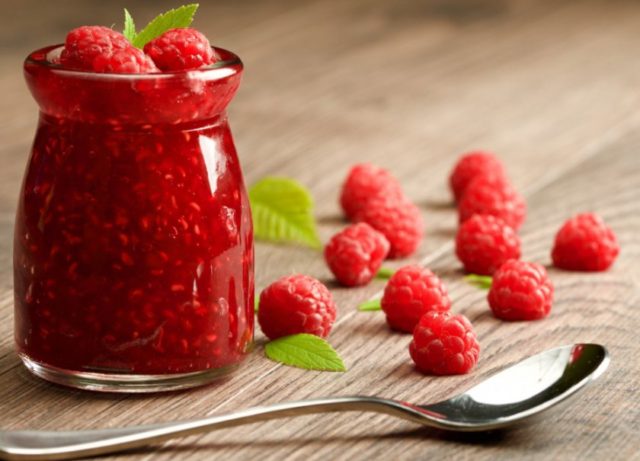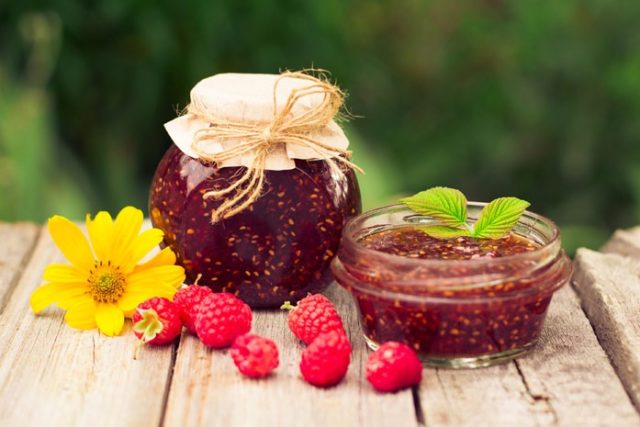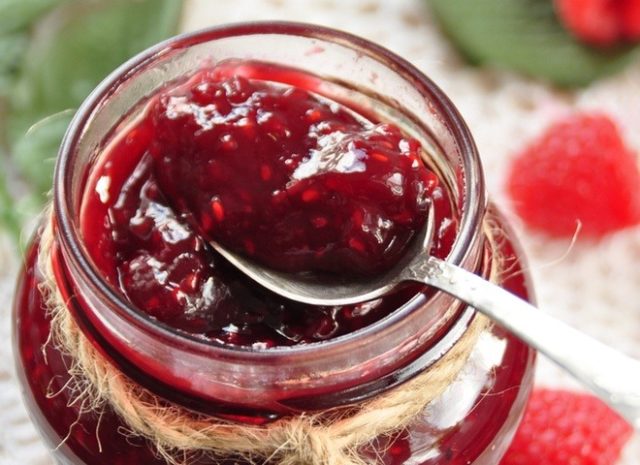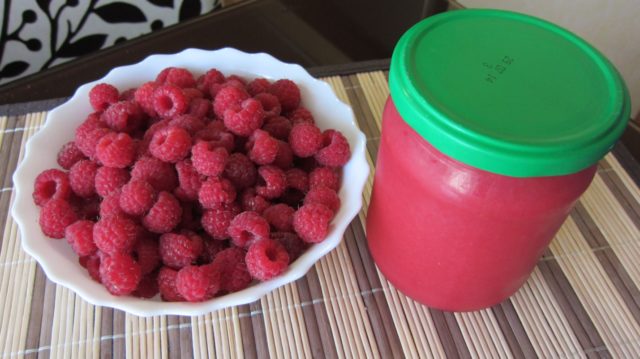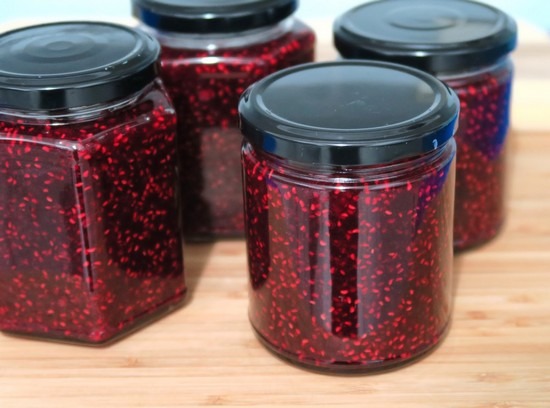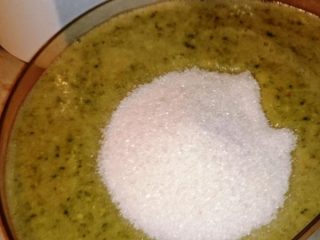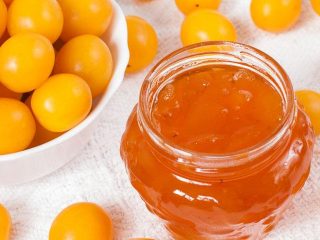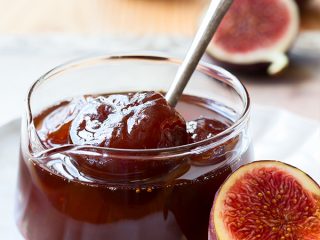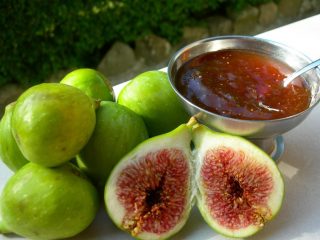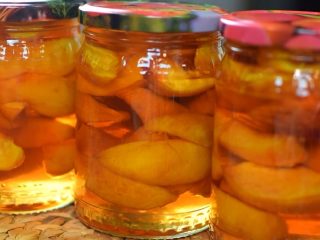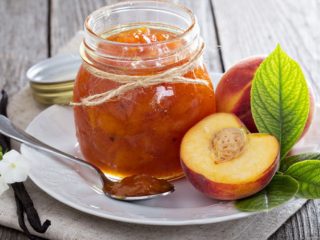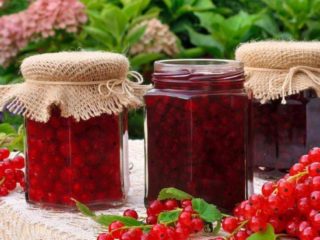Content
- 1 Properties of raspberry jam
- 2 What are the benefits of raspberry jam for the body?
- 3 Is it possible for a nursing mother to have raspberry jam?
- 4 Can pregnant women have raspberry jam?
- 5 Raspberry jam increases or decreases blood pressure
- 6 Using raspberry jam
- 7 How much raspberry jam can you eat?
- 8 Harm of raspberry jam
- 9 Conclusion
Raspberry jam is a traditional and beloved dessert, prepared annually for the winter. Even children know that warm tea with the addition of this product successfully helps treat a cold throat. But in fact, the benefits of raspberry jam are more significant. This berry is a real “treasury” of vitamins and healing substances; in addition, it retains most of its positive properties even after short-term boiling.
It must be remembered that this sweetness cannot be enjoyed thoughtlessly; it should be consumed with caution, not forgetting a sense of proportion. This is especially important if we are talking about a pregnant or nursing mother. It is also necessary to keep in mind that allergy sufferers or people with certain chronic health problems, as well as children under 3 years of age, should not consume this sweetness.
Properties of raspberry jam
Raspberry jam is a product made from whole or ground berries, usually boiled with sugar in syrup or in their own juice.
Its composition is rich:
- mono- and disaccharides;
- vitamins (primarily A, C, E);
- various minerals: phosphorus, magnesium, potassium, copper, iron, iodine, chlorine;
- organic acids (salicylic, ellagic, folic);
- plant phytoncides;
- pectins;
- fiber.
The beneficial properties of raspberry jam have long been known in folk medicine. It is used for:
- antimicrobial and anti-inflammatory effects;
- strengthening the immune system;
- normalization of metabolic processes;
- blood thinning;
- improving the color and condition of skin and hair;
- neutralization of carcinogens;
- obtaining an antidepressant effect.
The ability of raspberry jam to have a beneficial effect on health primarily depends on how long it was boiled. After long-term heat treatment, only beta-carotene, pectin and fiber in very small quantities, as well as some mineral salts and organic acids, remain in the composition of this sweet. Such jam is more likely to have value simply as a sweet treat, but not as a healing product or a source of vitamins.
What are the benefits of raspberry jam for the body?
The benefits of raspberry jam for human health are as follows:
- systematic consumption of this delicacy helps improve intestinal motility and active production of gastric juice;
- due to its ability to thin the blood, it reduces the risk of strokes;
- this jam is a natural antibiotic that actively fights inflammatory processes in the body;
- traditional medicine uses it to fight herpes;
- it helps with joint inflammation and is indicated in the treatment of rheumatoid arthritis;
- raspberry jam has antipyretic and diaphoretic properties;
- it is believed that it promotes active brain activity and improves memory;
- a significant amount of iron in its composition affects the increase in hemoglobin levels and is beneficial for anemia and anemia;
- Raspberry jam is sometimes called the “elixir of youth” - the vitamin complex included in its composition strengthens the immune system, supports vitality, healthy complexion, elasticity and beauty of hair, and helps cope with the negative effects of stress;
- beta-sitosterol, which raspberry seeds contain, is a substance that prevents the accumulation of cholesterol in blood vessels and the formation of blood clots, stimulates metabolism and is used to prevent certain types of cancer (prostate carcinoma, breast cancer).
Briefly about the benefits and harms of raspberry jam in the video:
Is it possible for a nursing mother to have raspberry jam?
There is no clear answer to the question whether raspberry jam can be consumed while breastfeeding. Undoubtedly, the vitamins and microelements that this product contains can be very useful for mother and her baby. However, we must not forget that raspberries are an allergen and in this sense can cause great harm.
Thus, deciding whether it is advisable to introduce raspberry jam during breastfeeding into the diet of a nursing mother should be based on the following:
- does the woman have a tendency to develop allergies to raspberries, in particular, skin rashes;
- Is the child healthy and is he currently at least 4-5 months old?
- It is advisable to first consult a pediatrician.
If you decide to try introducing raspberry jam, you should give preference to a natural product, prepared yourself, which does not contain dyes or preservatives. It is best to start with fresh, uncooked, pureed raspberries.
A nursing mother should try no more than 1 tsp for the first time. treats, preferably not on an empty stomach and in the first half of the day. After this, you need to observe the baby’s reaction for a couple of days. If an allergy manifests itself (in the form of a cough, rashes or spots on the skin), then the product should be excluded from the mother’s diet. In addition, due to the significant amount of sugar contained in raspberry jam, the baby may experience colic, increased gas production, or problems with bowel movements. In this case, this sweetness will not bring any benefit and should be abandoned.
If there is no negative reaction, then the mother can continue to eat raspberry jam little by little, gradually increasing its amount, but not more than 5 tsp. per day. You can also include it in various desserts: pudding, milk jelly or cottage cheese casserole. This will help the nursing mother diversify the menu and experience the benefits of the substances included in the product.
Can pregnant women have raspberry jam?
Raspberry jam in small quantities is quite acceptable for women to eat during pregnancy, if there are no general contraindications or allergic reactions.
Properties of raspberry jam that are beneficial for pregnant women:
- it contains a large amount of folic acid, which is necessary for expectant mothers for the normal development of the fetal nervous system;
- the vitamin complex that raspberry jam is rich in increases the mother’s immunity during pregnancy.
- the fiber included in its composition prevents constipation;
- this jam relieves swelling, intoxication of the body and can dull nausea;
- it improves the functioning of the circulatory system and increases the level of hemoglobin, which is very important for pregnant women, since during this period the volume of blood circulating in their body increases.
The recommended amount of raspberry jam during pregnancy is no more than 1-2 tbsp. l. per day along with warm tea or as an addition to porridge or cottage cheese.
In any case, it is advisable to discuss the use of this product during pregnancy with your doctor.
Raspberry jam increases or decreases blood pressure
Among the beneficial properties of raspberry jam is the ability to gently lower blood pressure. It does not relieve the symptoms of hypertension, but fights its causes. Raspberry jam helps remove excess fluid from the body, strengthens the walls of blood vessels, prevents the development of arrhythmia, reduces the load on the heart muscle, and has a diaphoretic effect.Therefore, hypertensive patients are recommended to regularly drink tea along with a few spoons of this delicacy. At the same time, you need to remember that raspberry jam can only be an auxiliary method of treatment, but it cannot replace the main medicine.
The vitamins and microelements contained in it help to establish metabolic processes and contribute to the overall strengthening of the body. However, it should be used with extreme caution to avoid an even greater decrease in blood pressure.
Using raspberry jam
It is recommended to use raspberry jam for medicinal or preventive purposes in its “pure” form or to make healthy tea.
The largest amount of active components remains in the berry, ground or frozen with sugar. “Jam without cooking” will bring the most benefits to the body, but it can be stored for no more than six months and only in the cellar or refrigerator. An alternative to it is the so-called “five-minute”. This jam also retains many of the beneficial substances contained in fresh raspberries, but can be stored for a year on a pantry shelf in sterilized glass jars under hermetically sealed lids.
To prepare medicinal tea, take 1 tbsp. l. raspberry jam, put in a large mug (300-350 ml), pour warm boiled, but not boiling, water and stir well. You can also add a slice of lemon to the cup. It is recommended to drink this drink before it gets cold.
How much raspberry jam can you eat?
In order for the benefits of raspberry jam for the human body to fully manifest itself, you need to enjoy this sweetness in moderation.
A reasonable rate of consumption of the product is considered to be 2-3 tbsp. l. in a day. Nutritionists recommend taking it with tea in the morning, preferably without bread.
Harm of raspberry jam
It is important to know that raspberry jam has not only benefits, but also harm – in case of certain health problems.
This product should not be used:
- people who have an allergic reaction to raspberries or suffer from asthma;
- those suffering from increased acidity of gastric juice or gastritis, since the composition of this product is rich in acids;
- for those who suffer from gout or are prone to the formation of kidney stones, the purines included in raspberry jam can cause an exacerbation of the disease;
- people diagnosed with hemophilia, since raspberry jam thins the blood;
- children under 3 years old - due to excess sweetness, it can contribute to the destruction of weak enamel of baby teeth.
People who have diabetes can eat raspberry jam made not with sugar, but with fructose.
In addition, this product is very high in calories (273 kcal per 100 g). Therefore, despite the benefits that it can bring, it is necessary to use it with caution for those who are prone to obesity or are overweight.
Conclusion
The benefits of raspberry jam are well known and have long been used in folk medicine. The vitamins, minerals and amino acids contained in this dessert make it a real cure for many ailments, especially if it is not boiled for too long during the preparation process.Due to the fact that raspberry jam is natural, its rich composition can benefit pregnant women and nursing mothers if consumed in moderation, after obtaining a doctor's permission. However, there are contraindications to this sweetness, including a tendency to allergies, a number of diseases and children under 3 years of age.
